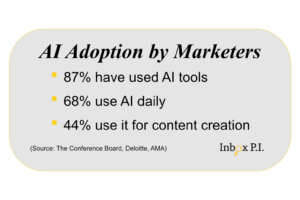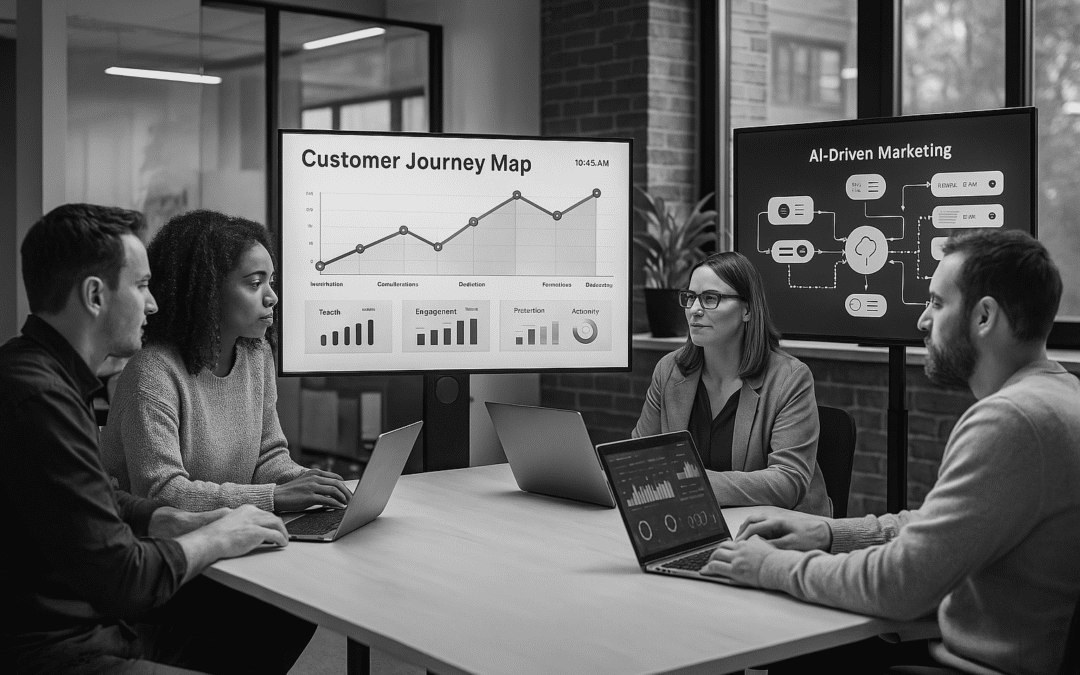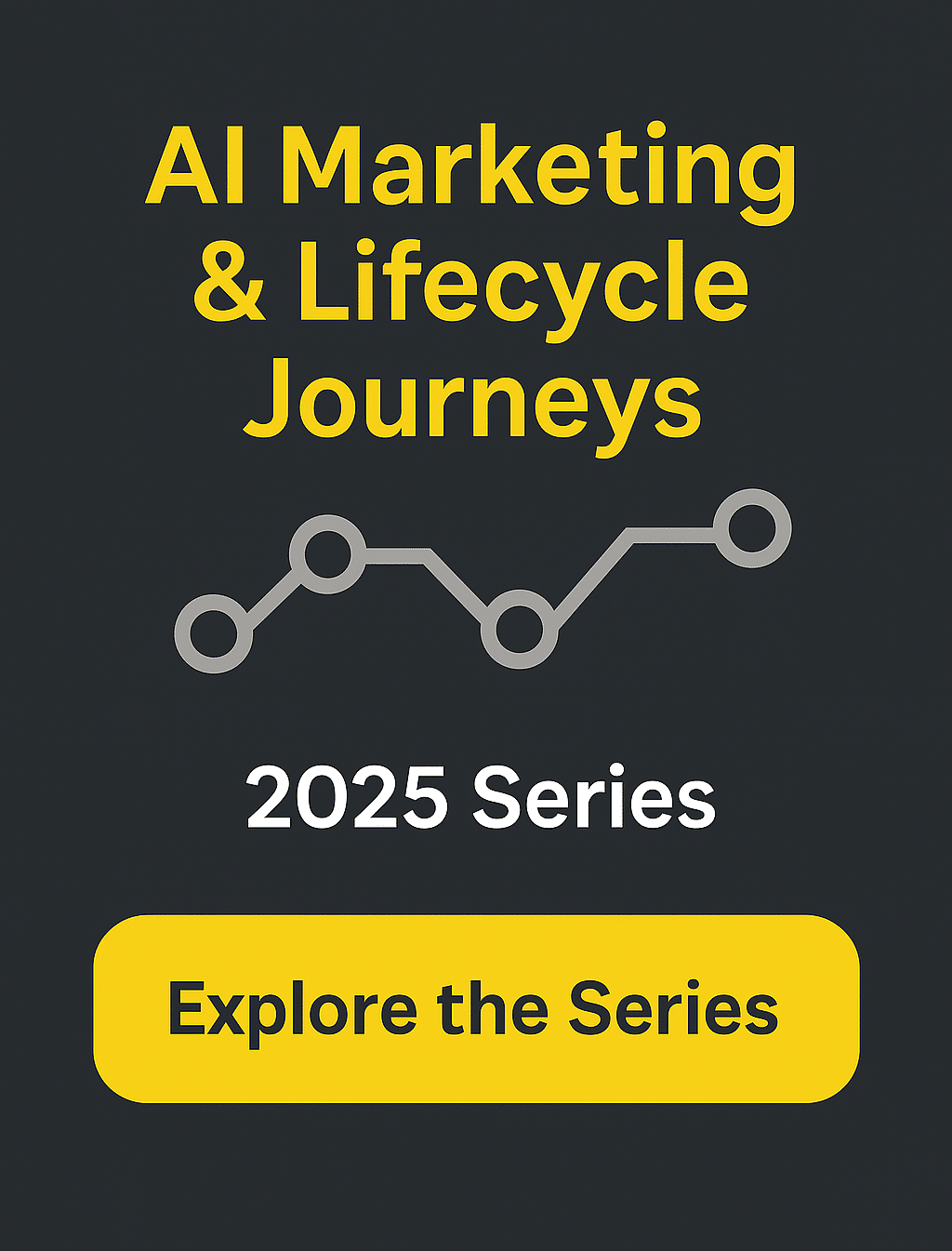Welcome to the AI Marketing & Lifecycle Journeys: 2025 Series.
Editor’s Note (Updated April 2025):
This article has been updated and expanded into two new posts for easier navigation and deeper insights. While the content below still offers value, I suggest starting with the updated articles:
- 👉 Part 1: How AI is Transforming Lifecycle Marketing
- 👉 Part 2: Future-Proofing Your Lifecycle Strategy with AI
I’ve refined examples, added new research, and made the content easier to digest for busy marketing leaders. Feel free to explore the original full-length version below, or jump to the updated insights above.
Recent research shows that AI use among the public jumped nearly tenfold in 2023. Its impact on marketing has been especially strong. AI tools are changing how marketers reach, keep, and convert customers at every stage of the buyer’s journey.
Here are six ways AI is changing lifecycle marketing. Let’s see how this will shape your strategy in the future.
AI in Marketing: Adoption at a Glance
Marketing teams have rapidly embraced AI’s potential. A recent study by The Conference Board found that 87% of marketers have tried AI tools. Also, 68% use AI every day in their work. Gartner research shows that 63% of marketing leaders have invested in AI or plan to in the next 24 months.
The transformation is particularly evident in content creation. Deloitte LLP, the American Marketing Association, and Duke University’s Fuqua School of Business conducted the CMO Study. It found that almost half of marketing leaders have used AI for content creation in the past three years. More than half of them applied AI to blogs, website content, social media, and emails.
1. Predictive Analytics: The Crystal Ball of Customer Behavior
AI-powered predictive analytics has emerged as the closest thing to a marketing crystal ball. These systems analyze historical data and spot patterns. They can predict if a lead will convert, if a subscriber might churn, or if a loyal customer is ready for an upsell.
Strategic Advantages
- Enhanced and More Accurate Segmentation: AI spots subtle customer groups by analyzing behavior patterns that are hard to find manually.
- Proactive Retention to Prevent Churn: Systems flag at-risk customers before they show obvious signs of disengagement, enabling timely intervention
- Optimized Nurturing Sequences: Lead journeys automatically adjust based on real-time engagement signals and conversion likelihood.

Real-World Application
Subscription businesses are using predictive churn models to identify at-risk customers up to 30 days before they cancel. This helps them create targeted retention offers. In some cases, this strategy has cut churn rates by up to 20%.
Marketing experts often rank predictive analytics as one of the top seven AI areas that make a big difference. It helps professionals spot trends, seize hidden chances, and reduce risks with great accuracy.
2. AI-Powered Hyper-Personalization: Beyond Basic Segmentation
Generic, one-size-fits-all marketing messages no longer cut it. Today’s consumers expect, and respond to, experiences tailored specifically to their preferences and behaviors. AI enables this hyper-personalization at scale. It analyzes data in real-time. This helps customize content, product suggestions, and email sequences for each user.
Performance Impacts
- Increased Engagement: AI creates content that matches user behavior. This boosts open rates, click-through rates, and overall engagement.
- Improved Customer Experience: Personalized recommendations and messages help customers feel understood. This boosts satisfaction and loyalty.
- Conversion Optimization: AI enhances product suggestions and messaging. This boosts the chances of purchases and other desired actions.
Recent industry data shows that 33% of marketers use AI to personalize customer content. This makes AI one of the top tools in marketing today.
AI is transforming lifecycle marketing in ways that were unimaginable just a few years ago.
Pioneer Example
Amazon and Netflix led the way with AI-driven recommendation engines for consumers. Meanwhile, B2B companies like Salesforce and Adobe used these methods to tailor complex customer journeys in enterprise sales. EdTech companies like Coursera use strategies to tailor learning paths. They base these paths on how students engage and perform.
3. Intelligent Email Automation: Beyond Basic Drip Campaigns
AI is taking email automation beyond basic triggers and drip campaigns. AI email platforms study engagement metrics and customer behavior. They send emails at optimal send times, with optimal content selections and follow-up sequences.
Key Innovations
- Dynamic Content Modules: Email sections that automatically adjust based on recipient preferences and behaviors.
- AI-Optimized Messaging: Machine learning systems that test and refine subject lines and copy elements.
- Automated Testing: Systems that continuously run A/B tests and implement winning combinations.
The Conference Board survey shows that 30% of marketers use AI mainly to create content faster. Email content is one of the top uses.
4. Conversational AI & Chatbots for Customer Engagement
Chatbots and AI-driven assistants are transforming customer interactions. Today’s conversational AI systems do more than just answer FAQs. They hold contextual chats that help qualify leads, give recommendations, and solve service problems.
How Marketers Benefit
- Response Efficiency: Faster response times leading to higher customer satisfaction.
- Lead Qualification: Automated systems that pre-qualify leads while gathering critical data points.
- Platform Integration: Seamless connection with CRM and marketing automation platforms
Industry research shows that enhancing customer service (26%) is a top use of AI in marketing today. Chatbots are key to this change.
More than 80% of marketers believe AI will improve productivity and performance.
5. AI-Driven Customer Retention Strategies
Keeping customers engaged post-purchase is just as crucial as acquiring them. AI has changed retention. It shifted from fixing problems to managing relationships. Now, it predicts when customers might leave. Then, it uses personalized tactics to keep them engaged at the right time.
Retention Tactics Using AI
- Disengagement Detection: Identifying disengaged users and re-engaging them with personalized offers
- Sentiment Analysis: Monitoring sentiment in customer feedback and responding proactively
- Dynamic Loyalty Programs: AI-powered systems that evolve rewards based on individual customer behaviors
These approaches allow businesses to identify at-risk customers and implement retention strategies before problems escalate.
6. AI vs. Human-Driven Marketing: Striking the Right Balance
While AI is powerful, it’s not a replacement for human creativity and strategic thinking. The best marketing strategies use AI for data-heavy tasks. This lets human marketers focus on storytelling, brand voice, and building emotional connections.
Where AI Excels
- Data Analysis and Pattern Recognition: Analyzing data points to identify trends beyond human capacity.
- Automating Repetitive Tasks: Managing routine processes with consistency.
- Real-Time Optimization: Continuously refining campaign performance based on incoming data.
Where Humans Win
- Crafting Compelling Narratives: Developing brand stories that connect with deeper human motivations.
- Building Emotional Connections: Creating authentic relationships that resonate on emotional levels.
- Strategic Direction: Making strategic decisions based on AI insights.
A notable 82% of marketers and communicators surveyed by The Conference Board believe AI will boost productivity. They expect benefits in learning, development, and financial outcomes. This suggests that AI is viewed more as an amplifier of human capabilities rather than a replacement.
Predictions for the Future of AI in Lifecycle Marketing
AI-Powered Content Creation Will Become the Norm: AI-generated email copy, social media posts, and even blog articles will become more common (with human oversight, of course!). Data shows this trend is happening now. About 44% of marketers use AI to summarize content. Additionally, 41% use it to spark ideas and do initial work.
- Voice and Visual AI Boost Personalization: AI voice search and visual recognition will deepen personalization in marketing campaigns.
- AI Regulation and Ethics Will Impact Strategy: As AI use increases, companies must address data privacy, bias, and transparency in automated decision-making
- Marketing Automation Will Expand: Delegge’s research shows that AI is greatly impacting marketing automation. It streamlines processes and lets marketers focus on strategies instead of repetitive tasks.
- Programmatic Advertising Will Get Smarter: AI will keep improving how it analyzes user behavior. This means ads will reach the right audience at the right time. So, ad spending will be more efficient.
Final Thoughts
AI is transforming lifecycle marketing in ways that were unimaginable just a few years ago. Research shows we’re just “scratching the surface” of AI in marketing. Adoption rates are rising quickly. Marketers using AI tools will better predict customer needs. They will personalize on a large scale and automate tasks for efficiency. Best of all, they will still keep the human touch that makes marketing effective.
Marketers who use AI tools can better predict what customers need. They can also personalize experiences on a larger scale and automate tasks to save time and effort. All these benefits while maintaining the human touch that makes marketing truly effective.
Taking Action
- Audit Your Current Tech Stack: Evaluate which existing marketing platforms offer AI capabilities you may not be fully utilizing
- Start Small: Begin with contained experiments in AI-powered applications
- Develop Guidelines: Establish clear protocols for data usage and AI implementation
- Focus on Training: Equip your marketing team with the skills to work effectively with AI systems
- Measure Results: Track the impact of AI on your marketing performance
If you’re not yet leveraging AI in your lifecycle marketing strategy, now is the time to start experimenting. Half of marketing professionals believe AI will lead future product and service innovation. So, building your AI marketing foundation is key for smart strategies.
Read the next post in the series, Smarter Email Segments with AI. Explore how AI is transforming traditional marketing funnels into adaptive, behavior driven journeys. AI is helping marketers like you meet the right person with the right message at exactly the right time.
Works Cited
-
- Delegge, P. (2024). How AI is transforming marketing. MarketingHire. https://www.marketinghire.com/blog/how-ai-is-transforming-marketing
- Deloitte. (2025). Now decides next: Generating a new future. https://www2.deloitte.com/us/en/pages/consulting/articles/state-of-generative-ai-in-enterprise.html
- The Conference Board. (2024). AI marketing and communications survey: CMO and CCO meter.https://www.conference-board.org/research/CMO-CCO-Meter/AI-Marketing-Communications-survey
- Gartner. (2003). Gartner Survey Finds 63% of Marketing Leaders Plan to Invest in Generative AI in the Next 24 Months. https://www.gartner.com/en/newsroom/press-releases/2023-08-23-gartner-survey-finds-63-percent-of-marketing-leaders-plan-to-invest-in-generative-ai-in-the-next-24-months
- Hughes, D. (n.d.). Best examples of AI in marketing. Digital Marketing Institute. https://digitalmarketinginstitute.com/blog/some-inspiring-uses-of-ai-in-digital-marketing




